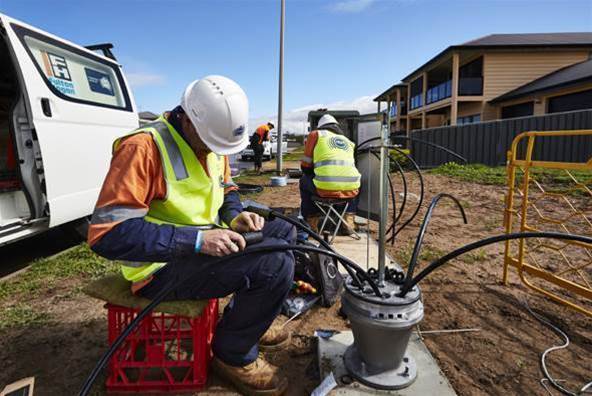Telstra is expecting to take a $700 million hit to its income for the 2018 financial year as a result of NBN Co's decision to freeze the HFC rollout.

The telco today issued revised guidance for its full fiscal year, blaming the expected six to nine-month delays to the HFC network for the forecast reductions in its revenue.
It had previously expected total income to sit between $28.3 billion and $30.2 billion for FY18, but has revised that down to between $27.6 billion and $29.5 billion.
It represents a reduction of $700 million.
The telco is also expecting both its EBITDA and payments from NBN Co under the pair's definitive agreement for FY18 to come in $600 million less than previously forecast.
However, it noted that the financial revisions represented an "in-year delay" and that the payments would simply "move forward into next year". It maintained its guidance on dividend.
"The most significant impact from a timing perspective is the proportion of one-off receipts ... to Telstra from NBN Co being delayed into future periods," Telstra said.
"The revenue recognition from Telstra’s commercial works contracts with NBN Co will also be delayed."
Telstra CEO Andy Penn told financial analysts that the telco would continue to work for NBN Co, but that recognition of payments for that work would be delayed into FY19.
The telco said "benefits" such as lower NBN costs to connect, lower network payments to NBN Co, and retained wholesale income for the period would somewhat mitigate this reduction in NBN Co payments.
The HFC freeze will also give Telstra $200 million less in free cash flow for the year.
Despite the impact for FY18, Telstra said the delay would actually be "modestly financially positive" over the full life of the NBN rollout "due to the effects of a natural hedge".
HFC's future as an NBN tech
NBN Co revealed its intention to halt all new HFC orders late last month.
“This pause will be in effect until incremental field work is undertaken to raise the quality of service for end users,” it said at the time.
The network builder is initially planning to focus on fixing service quality for the 370,000 users already connected to the HFC network, and then make its way through the backlog of premises that have proven difficult to connect.
The HFC network - purchased from Telstra and Optus - is responsible for the largest number of unserviceable connections in the NBN rollout.
NBN Co has claimed the temporary HFC freeze won't impact its ability to meet its goal of completing the rollout by 2020.
But the delay has raised questions about the cost involved to remedy the HFC problems, and whether it will be sufficiently high enough to force NBN Co to abandon part or all of the rest of the HFC rollout in favour of an alternative technology, such as fibre-to-the-curb (FTTC).
Telstra CEO Andy Penn deflected questions raised today on the future of HFC as an NBN technology, but noted Telstra would not be hurt financially should NBN Co decide to pull the plug on the rest of the HFC rollout.
Penn said it was not for him to comment on "whether it’s likely they will pull out" of the HFC rollout.
But he said the contract that Telstra had to sell its HFC network "provided for NBN to take the asset on an as-is where-is basis".
"So to the extent that they decide not to use those assets they still have an obligation to take them from us on the terms that currently agreed," he said, making it clear that Telstra would still get all subscriber payments if HFC is axed.
Prospect of more delays
NBN Co's initial guidance is for a six-to-nine month delay to its HFC network rollout and to its ability to activate new orders while it tries to fix problems on the network.
But financial analysts are worried about the impact of the delays if they stretch beyond six months, and potentially exceed even the nine-month window.
For NBN Co, this will depend on how quickly it can rectify the problems it has identified on the HFC network.
Telstra's Penn deflected questions on how difficult that might be.
"The extent of the remedy is really a question for NBN Co," he said.
"The only point I would say is the HFC is continuing to perform as it always has and very well for our Foxtel customers and for Telstra’s existing broadband customers.
"This isn’t an issue with the HFC per se.
"At the point the HFC asset is handed over to NBN Co, they obviously make some technology changes to it to enable it to be utilised for an NBN service, and it’s in those changes where an issue has emerged for a number of customers."
Penn said he couldn't comment on the possibility that the problems would take longer than nine months to fix.
Pulls pin on HFC sales sooner
NBN Co had planned to have RSPs officially stop selling new HFC services from December 11, but Telstra is hoping to pull the plug sooner.
"We’re working with NBN Co right now to see if we can cease sale [on HFC] earlier than that because we think that’s in the best interest of customers," Penn said.
"So we expect to implement that over the next day or two."
The move could be seen as an abundance of caution by Telstra to avoid a last-minute rush of customers onto the NBN HFC network, knowing that doing so could exacerbate problems.
The telco recently had to compensate 42,000 NBN customers whose retail product could not be delivered due to issues with NBN Co's network.


_(23).jpg&h=140&w=231&c=1&s=0)

_(20).jpg&h=140&w=231&c=1&s=0)
_(28).jpg&h=140&w=231&c=1&s=0)





 iTnews Executive Retreat - Security Leaders Edition
iTnews Executive Retreat - Security Leaders Edition
 iTnews Cloud Covered Breakfast Summit
iTnews Cloud Covered Breakfast Summit
 Melbourne Cloud & Datacenter Convention 2026
Melbourne Cloud & Datacenter Convention 2026
 The 2026 iAwards
The 2026 iAwards











_(1).jpg&h=140&w=231&c=1&s=0)



